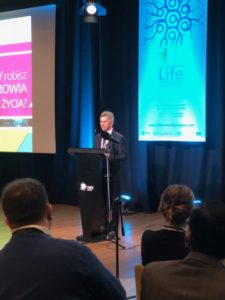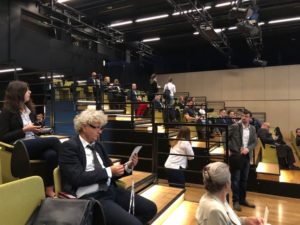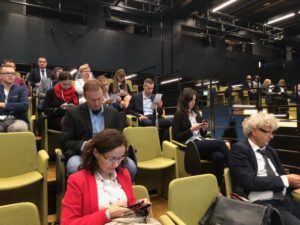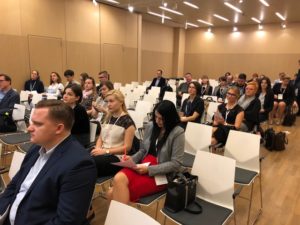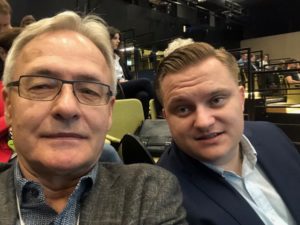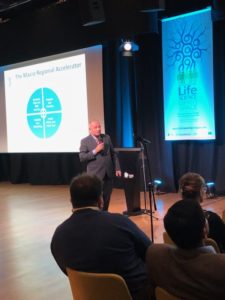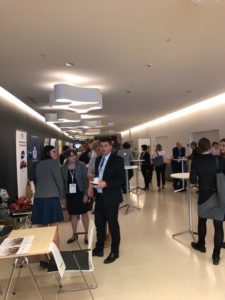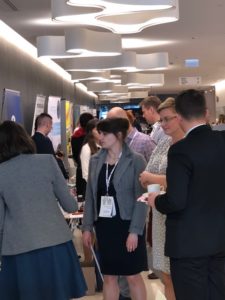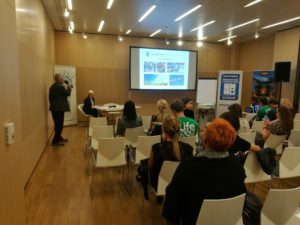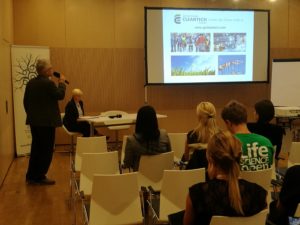On October 11, 2018, SPCleantech participated as a partner in the Life Science Open Space conference 2018 – Open Cooperation and Innovation Forum for Health and Quality of Life at the ICE Congress Center in Krakow. Open Space is an open Cooperation and Innovation Forum for Health and Quality of Life addressed to people representing all fields of science, business and administration, interested in technology, innovation, open to cooperation or seeking partners for development of projects aimed at improving health and quality of life.
During the conference, the president of SPCleantech, Janusz Kahl presented the cluster’s commitment and a proposal for cooperation within the SPCleantech cooperation platform: Bio-economy and circular economy, (GOZ).
SPCleantech has been very actively involved in the implementation of the European Commission’s vision and strategy based on the promotion of a new economic model based on the assumption that the value of products, materials and resources is to be maintained in the economy for as long as possible to ultimately reduce waste generation to a minimum. – known as Circular economy. In this concept, raw materials are repeatedly put into circulation many times, often passing from one branch of industry to another.
Priority areas:
- plastics
- food waste
- critical raw materials
- wastes from construction and demolition
- biomass and bioproducts
SPCleantech is particularly interested in cooperation with individuals, companies, municipalities, cities, organizations and institutions that have knowledge or want to participate in the process described below.
From a linear economy to a circular economy – It’s about closing the product’s life cycle and switching from:
- linear economy model (obtaining raw material – production – utilization – waste utilization)
- irculation model (production-use – use of waste as raw material in the next production cycle)
Designing in a circular economy – cooperation with designers: material experts, chemists, producers and recycling companies
- design for durability
- designing for leasing / services
- design for re-use in production
- designing for material recovery
Consumption in circular economy thanks to innovative business models
- product as a service (product-as-a-service), payment for use, rental or making available, circular subscription concepts, leasing and share / access for many users
- sharing economy, internet platforms
- total cost of ownership (bidding) – purchase price, operating cost, cost of disposal, potential uses and its value
Effective production in terms of resource use
- resource efficiency – secondary materials, by-products, RES, innovative business models, new forms of cooperation
- industrial symbiosis – side products used as a resource by others
Construction in closed circuit
- industrial production and 3D printing of building modules
- re-use and high-value recycle of components and materials
- sharing and designing multi-purpose buildings
Unleashing the potential of a circular economy
- ensuring economic growth
- creating new jobs
- protection of the global environment
Unfortunately, in the initial phase of the EC vision implementation, we encounter many barriers in Poland, such as: i
- lack of knowledge about the way of moving to a circular economy – accounting, financial modeling, marketing and value creation
- the lack of a circular economy relationship with the basics of doing business and making it an important part of every organization’s daily activities
- no regulations, cooperation, supervision, dynamics of supply chains, data transparency and cultural attitude
- no industrial programs and infrastructure needed to re-use by-products – intelligent reverse logistics
- lack of sufficient consumer demand for more sustainable products – price
- lack of supply chains, especially those of global importance – coordination of sustainable material flow and opening up to innovations needed to
- design new systems – operation scale
- lack of awareness among consumers, society, enterprises, politicians – change in the way of thinking – education



